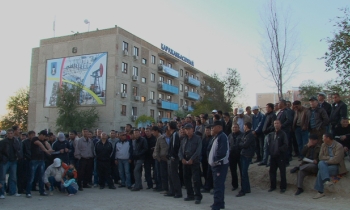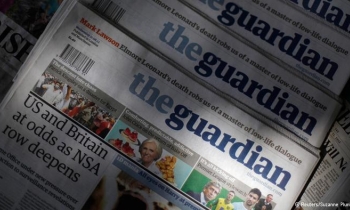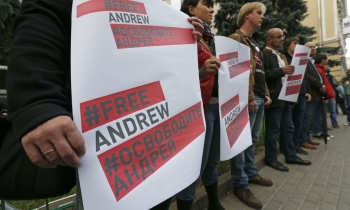The Kashmir Times Delhi Bureau Chief Iftikhar Gilani's recently released book 'My Days in Prison' (Penguin, Rs 195) reveals a shocking story of trial, temerity and triumph and exposes fancies of bureaucracy, politicians, police and intelligence agencies bent to make democracy and liberty hostage to their whims.
With abundant pathos and black humour, Gilani has used his skills as a journalist to transcend the immediacy and specificity of his own case and focuses attention on the plight of the system's other victims and the sadistic, dehumanizing ways of jail officials.
Spending eight months in Tihar jail, which he dubs as one of the worst prisons in the country despite the hallow of over publicised reforms, Iftikhar says he was 'reborn'. One of the charges he faced was that he was working for Pakistan's ISI and had written against India.
Police officials briefed some reporters that he had confessed to being an ISI agent whereas the reality was opposite. He was imprisoned under the archaic Official Secrets Act (OSA) 1923, for possessing out of date information on Indian troop formations in Jammu and Kashmir published by a Pakistani research institute and widely available on the internet.
He was finally released on January 13, 2003, after the case against him could not be proved because of contradictions and inaccuracies in the argument and the charges were proved flimsy and baseless.
According to the book, the Intelligence Bureau (IB) fabricated evidence but the Military Intelligence (MI) came to his rescue and stuck to the truth. The MI, which had been tasked to evaluate the IB charges, gave its firm opinion that Iftikhar was innocent.
One of the charges that Iftikhar faced was that he had written about 'unrest' in Skardu which is in India. To the horror of everyone, the interrogators and not even judiciary knew that that Skardu is in Pakistan Occupied Kashmir (POK).
The document for which Iftikhar was charged and dubbed anti-India, had been downloaded from the website of the Institute of Strategic Studies, Pakistan. The evidence attached to Iftikhar's charge-sheet was a 'doctored version'' of the Pakistani institute's document, the book says. 'Apparently, the sleuths of the IB had started tampering with the document while they were in my house when I was locked inside the bedroom. On top of the document, which was in a WordStar format, they inserted the line 'Only for reference, strictly not for publication or circulation...The document presented to the Delhi Police consisted only of a few annexures as a self-contained database.
They removed the annexure numbers without which it looked like a classified document. On the basis of this tampered document, I was charged with a criminal case under the Official Secrets Act, 1923,' Gilani says in the book.
Gilani says that throughout the court proceedings, the document was kept in a sealed cover and he and his lawyers were not allowed to see it. 'I had repeatedly told the IB men, as well as the Delhi Police, that it was part of a published document and I had stored it in my computer only for reference purposes.'
He says that the IB came up with another document against him to persuade the court that he was an insider of the Hizb-ul-Mujahideen.
This document was actually a note circulated by Indian intelligence officers among journalists reporting on Kashmir. The note was eventually dropped when the chargesheet was filed.
As if that was not enough, his marriage with the daughter of Syed Ali Shah Geelani, leader of the pro-Pakistan Jamat-i-Islami in Jammu and Kashmir, 'came in handy for them.' 'They clubbed me with him and tried to kill two birds with one stone. This strengthened their case and they were able to persuade the government to go along with the game,'' Iftikhar says.
With charges having been framed, Iftikhar was now in jail, transformed overnight from a journalist into part of an anti-India espionage racket. Life in jail was worse, according to the 148-page book. He was confined to the high-security ward, subjected to physical beatings by fellow prisoners till he bled and fell unconscious, made to clean toilets with his shirt and forced to wear that shirt again...Later, he was beaten by some inmate for wearing the smelly shirt and 'spreading' filth everywhere. 'There was one final ritual of indignity and humiliation to go through before entering the jail: I was asked to strip along with other prisoners', says the book.
In the high-security cell, in solitary confinement, Iftikhar says that true meaning of socialization and companionship dawned on him and he realized that nothing was more dehumanizing that the absence of human company. "It was a 'kal kothri', death cell meant for those awaiting execution'.
Later, when Iftikhar was shifted to general ward, he gives an elaborate account of the harassment and torture that the inmates are subjected to, the discrimination between foreigners and local prisoners because foreigners can spend money, and various other blatant violations of the rule of law and jail manual.
'If an individual gets caught in the labyrinthine world of secret security services, law enforcement and justice, he will find it extremely difficult to get out of it unless he finds a happy coincidence of support, solidarity and a stroke of luck. My journey to liberty was just such a difficult expedition, fraught with twists and turns, never easy, never predictable, with hope giving way to despair and despair sprouting fresh hope,'' Iftikhar says.
A revealing and a real life thriller with all the melodrama, Iftikhar Gilani's harrowing experience reveals in a flash the deep-rooted prejudice against Kashmir and Kashmiris among the so-called elite in Delhi, persons running institutions which are supposed to be fair, and reveals also the deep commitment to human rights in many sections of Indian society in academia as well as in the media, says country's leading jurist and columnist A. G. Noorani.
His book also makes a strong case for what he calls 'urgent course correction' in the handling of OS Act cases. Several such cases have been listed in the book. Gilani says, the tendency to book people in and around Delhi under the Act has assumed 'menacing proportions'.
The book is also full of humerous anecdotes and author's interaction with thieves, pickpockets and other criminals and their ways of working. There is mention of a Delhi Police official, who was accused of shooting two businessmen in Connaught Place in broad day light and dubbing them as gangsters. In Jail, he had done a diploma in human rights and was pursuing a Ph.D in the same subject.









